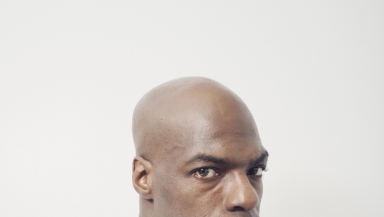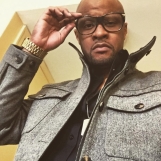
A Christian rapper who confessed to murder nearly 20 years after he did it says he has no regrets about owning up, because it put him right with God.
Trevell Coleman, better known as the rapper G Dep, which stands for "ghetto dependent", was a rising star on the New York hip-hop scene and had been signed to megastar Puff Daddy's Bad Boy record label in a $350,000 recording contract.
He also had a wife, Crystal, and twin boys.
But he was finding it increasingly difficult to cope with his guilty conscience.
In autumn 1993, when he was 18, Trevell shot John Henkel three times with a 40-caliber handgun on Park Avenue in Manhattan after his attempt to rob him went wrong. It turned out Henkel had just $6 in his wallet at the time.
Trevell has described how, by 2010, he had already lost his recording contract and developed a drug problem as he struggled to quiet his conscience. In the end he could no longer keep the secret to himself. He told his wife and then went to the police.
He had seen Henkel when riding past on his bike, he tells Mike Wooldridge of Heart and Soul: The Dilemma, to be broadcast by BBC World Service this weekend.
"I jumped off the bike. Went over to him. I tried to persuade him to give me his money," he says.
Henkel grabbed the gun, tussled and got free.
"I fired the gun," recalls Trevell. He kept firing, then got on the bike and ran. He did not realise he had killed him but could not stop worrying about it.
"I felt like I did something that was bad, it was terrible. I just wished that he was alright."
He says in the end the drugs did not help.
"I always knew it was something in my past that did not sit right with me."
He could feel himself turning into an "empty thing", becoming a person who cared only about material things and not other people. "I was thinking, if I died with this thing on my soul, would I burn in hell?"
He felt he was not really living, that God was testing him.
His wife was surprised when he owned up to her was surprised, because he is kind-hearted and cannot even tell their children off when they do something wrong. She thought at first he was hallucinating and she advised him to go and see their parish priest.
Instead, at the end of 2010, he went to the police.
"The first time I went, I said to the officer that I wanted to turn myself in." They swapped numbers, he left and waited for a call that never came. So he went back and the police found the details.
He does not regret turning himself in. "I wanted to get right with God."
He adds: "It was what had to happen. If he did die, that was what I was there for." His trial took place in 2012. He says his 15 year sentence, which he is serving at a high security jail in New York State, was a "blessing", because he could have got 25.
He says: "You can confess to a priest but you also have to form an act of contrition."
Murder is not like swearing.
"If you take a life, it is something you have to make amends for. I know me doing that, God will forgive me even more."
He was brought up a Christian by his devout Catholic mother, and interned at a law firm before going to college, but withdrew to try and make it in music.
He had started writing rap in his early teens. "The way people put words together, it was kinda like magical to me almost." His debut album Child of the Ghetto was based on his life in the streets around Manhattan.
Crystal describes being picked up by an entire "caravan" of cars on their first date. The police turned up. She says: "I literally had a gun in my face."
He began to get addicted to PCP or "angel dust" in his attempt to dull the memories. "I could see it start to get to him. Trevell and I had a big thing," says Crystal. "We always prayed together. That was one of the things that attracted me to him because we were both Catholics. The simple things. He always prays over a meal."
He would stand in the middle of the kitchen and say: "Praise God." But he struggled to cope with the pressure of success, such as a five-month promotional tour.
"When he came back he seemed fine but he was different," says Crystal. He became even more religious and would stand in the kitchen, screaming "God", says Crystal. She found he seemed different after he admitted it. "He had suffered with what was going on and had imprisoned himself for years."
Trevell Coleman will feature on Heart and Soul on the BBC World Service, 9-10am, Sunday 10 July.

















